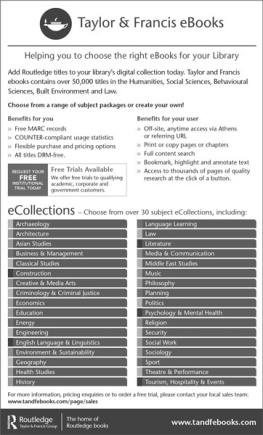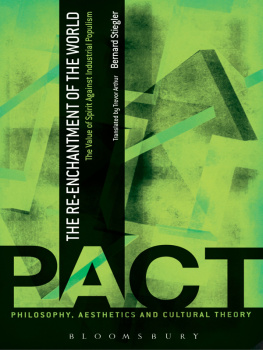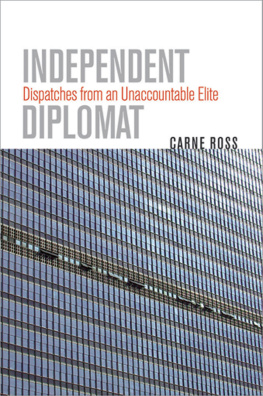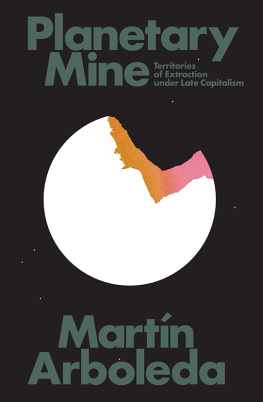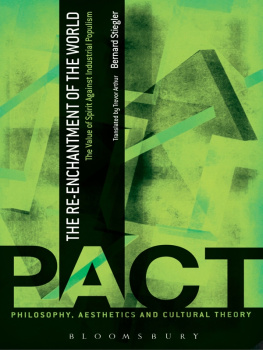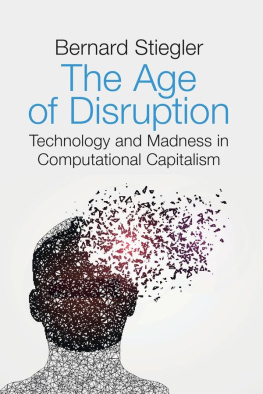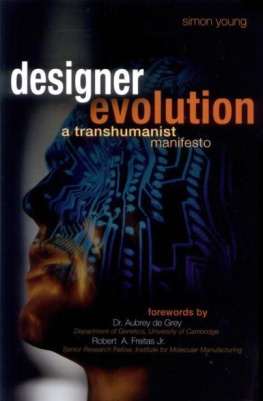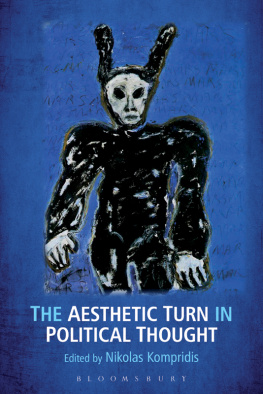Bernard Stiegler is one of the most interesting philosophers of technology writing today and the student of Derrida of greatest relevance to the contemporary cultural scene. However, Stieglers work has been so far available in English only in piecemeal form. Ross Abbinnett remedies that problem in this book, which provides a patient and thoughtful reconstruction of Stieglers entire intellectual trajectory. Here readers will acquire a deep and systematic sense of Stieglers broad conception of technology, which ranges from Platos extended dream state, through the accelerated pace of modern industrial society, to the potential eclipse of the human spirit in the name of digital dexterity. Those who seek a middle way between embracing and refusing this transhumanizing trajectory will find much insight in this book.
Steve Fuller, Auguste Comte Chair in Social Epistemology, University of Warwick, UK
The Thought of Bernard Stiegler
This book provides a comprehensive account of the work of Bernard Stiegler, one of the most influential living social and political philosophers of the twentyfirst century. Focusing on Stieglers thought on hyperindustrial society and the development of technological systems through which the social, economic and political life of human beings has been transformed, the author examines Stieglers claim that the human species is originally technological and that to understand the evolution of human society, we must first understand the interface between human beings and technology.
A study of the reciprocal development of technical instruments and human faculties, that offers a chapterbychapter account of how this relationship is played out in the digital, informatic and biotechnological programmes of hyperindustrial society, The Thought of Bernard Stiegler develops Stieglers idea of technology as a pharmakon: a network of systems that provoke both existential despair and unprecedented modes of aesthetic, literary and philosophical creativity that can potentially revitalize the political culture of human beings.
As such, it will appeal to social and political theorists and philosophers concerned with our postmodern inheritance.
Ross Abbinnett is Senior Lecturer in Social and Political Theory and Programme Director of the BA in Sociology at the University of Birmingham, UK.
Media, Culture and Critique: Future Imperfect
Series Editors:
Ross Abbinnett (University of Birmingham) and Graeme Gilloch (Lancaster University)
A platform for new works devoted to exploring contemporary crises and drawing on and developing different critical traditions such as neo-Marxism, feminism, postcolonialism, queer theory, poststructuralism, critical discourse analysis, and ecological and environmental approaches Media, Culture and Critique: Future Imperfect presents theoretically-informed and politicallyengaged studies that share a fundamental concern with interrogating the discrepancies between the potentialities and rhetorics of new technologies and their actual utilization in the service of hegemonic interests. Whether with respect to 21st century capitalism and new political economies of culture, global mediascapes and digital economies, urban transformation and militarization, the proliferation of consumption and media sites and spaces, biotechnologies and the body, or the exploitation and destruction of Nature, the series welcomes theoretically-driven explorations of the technological and mediatized future, and the cultural manifestations of neoliberalism.
1. The Thought of Bernard Stiegler
Capitalism, Technology and the Politics of Spirit
Ross Abbinnett
The Thought of Bernard Stiegler
Capitalism, Technology and the Politics of Spirit
Ross Abbinnett

First published 2018
by Routledge
2 Park Square, Milton Park, Abingdon, Oxon, OX14 4RN
and by Routledge
711 Third Avenue, New York, NY 10017
Routledge is an imprint of the Taylor & Francis Group, an informa business
2018 Ross Abbinnett
The right of Ross Abbinnett to be identified as the author of this work has been asserted by him in accordance with sections 77 and 78 of the Copyright, Designs and Patents Act 1988.
All rights reserved. No part of this book may be reprinted or reproduced or utilised in any form or by any electronic, mechanical, or other means, now known or hereafter invented, including photocopying and recording, or in any information storage or retrieval system, without permission in writing from the publishers.
Trademark notice: Product or corporate names may be trademarks or registered trademarks, and are used only for identification and explanation without intent to infringe.
British Library Cataloguing-in-Publication Data
A catalogue record for this book is available from the British Library
Library of Congress Cataloging in Publication Data
A catalog record for this book has been requested
ISBN: 978-0-415-79381-0 (hbk)
ISBN: 978-1-315-21087-2 (ebk)
For Sian and Simon who are, as ever, the bravest and the best. And for the graduate students who have kept faith with the Contemporary Philosophy of Technology Group at Birmingham.
I must say that I remain a materialist in the sense of a materialism that does not deny the spirit, but which poses that spirit, while not reducible to matter, is always conditioned by it.
Bernard Stiegler, How I Became a Philosopher
Remember thee?
Ay, thou poor ghost, while memory holds a seat
In this distracted globe.
William Shakespeare, Hamlet
Biography
Bernard Stiegler was born on 1 April 1952 in Sarcelles (95), France. He became a philosopher during a period of incarceration in Prison Saint-Michel in Toulouse, and the Centre de dtention in Muret, which lasted from 1978 to 1983. In a piece of biographical detail that is now as well known as Roland Barthes being killed by a laundry van, his sentence was imposed for armed robbery, and the details of his time in prison are recounted in his essay How I Became a Philosopher (Stiegler, 2009b: 126). Following his release, Stiegler became a professional philosopher and public intellectual, and is currently a professor at the Universit de Technologie in Compigne, visiting professor at Goldsmiths College, London, and director of the Department of Cultural Development at the Centre Georges Pompidou. In 2006 he founded the political-aesthetic group Ars Industrialis, through which he and his collaborators continue to campaign for a massive investment by the International Monetary Fund (IMF), the World Bank and the European Union (EU) in global culture. This much can be gained from Wikipedia, along with summaries of his main works, including the centrepiece of his philosophy, Technics and Time. The purpose of this introduction, however, is not to present a potted biography, or to weave together the events of Stieglers life with his philosophical ideas. Rather, my aim is to provide a brief account of the main themes of Stieglers work (originary technicity, general organology, the pharmakon), and to show, again very briefly, how these ideas are related to his readings of Derrida, Simondon, Freud, Marx, Heidegger and Leroi-Gourhan. I will also provide an account of the expository strategy of the book, which focuses on (1) the way in which Stiegler conceives the globally disorientating power of contemporary technological programmes; (2) his identification of the unforeseen effects of hospitality, desire and recognition (spirit) that arise from the capitalization of human life; and (3) his orientation to contemporary political, philosophical and sociological debates on the technoscientific future of humanity.

